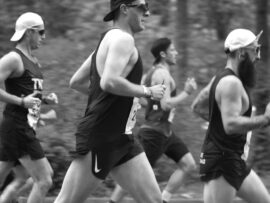The recent tragic events in Boston have left Americans with a myriad of feelings, thoughts and emotions.
There was the initial shock of a terrorist attack on American soil, in a city saturated with American history and culture, and at an event that brings out the best in so many people.
Then there was anger! Who would dare to kill and maim innocent men, women and children? Why would they choose an event that is purely recreational and apolitical? Is it fair for runners whose lifestyle is an athletic one, who train every day, 365 days a year, to suddenly have no legs to run on? What deranged individual or belief system could condone the horror and carnage in Boston? How could the terrorists have just vanished into thin air?
Then there was the drama! Law enforcement had located Terrorist A and killed him, but Terrorist B had escaped, and a massive manhunt ensued, shutting down an entire city. The FBI turned to the American people for assistance, and according to the Associated Press, the American public responded with over 300,000 tips per minute! Finally, by Friday evening, the FBI had Terrorist B in custody…alive! And while many more details will certainly come to light over the next few weeks, we know that the terrorists were Chechnya-born, with Islamic ties, and that they seemed to perceive the US and its culture as a threat to their world view.
Now, it is time to reflect. What can we learn from this sad sequence of events? What should we be thinking? Is there a lesson that we can learn from these occurrences?
I always find that taking a look at the weekly Torah portion somehow gives perspective to the events in our lives. In this week’s Torah portion of Emor, we find the concept of the omer offering. The Torah teaches us that in Temple times, before any grain from the new crop could be eaten, an offering of barley had to be brought to the Temple in Jerusalem on the second day of Passover. The Torah then instructs that forty-nine days be counted until the holiday of Shavuos. On Shavuos, a meal-offering from the new wheat crop, in the form of two loaves of bread, was to be brought to the Temple.
This strange ritual of a barley offering, followed by a forty-nine-day counting, culminating in an offering of wheat bread, seems quite odd. What is the significance of this mitzvah, and is there something that we can learn from it?
Our Sages considered barley to be animal food. The bread offering on Shavuos, however, was composed of wheat, a more dignified grain, fit for human consumption. When the fledgling Jewish nation left Egypt on Passover, they were, in a certain sense, more in touch with their base animalistic nature, driven by desire rather than their more uniquely human qualities. The Almighty gave the Israelites a 49-step process of self-improvement to prepare them for Shavuos and receiving the Torah. Each day the Jewish nation counted towards the goal of self-actualization, but more importantly, they made each day count. A mere forty-nine days later, the process succeeded, and the Jewish nation found itself at the pinnacle of human perfection, ready to listen to the voice of the Almighty and receive the Torah. Each year between Passover and Shavuos, we mimic this process and embark upon a seven-week campaign to improve ourselves and thus be ready to commemorate receiving the Torah at Mount Sinai.
The Boston marathon tragedy highlights the two extremes of human nature. At one end are the animal-like terrorist brothers Tsarnaev, individuals with no respect for the sanctity of human life and the values of freedom. Here we have someone capable of calmly walking from the scene of horror that he had just inflicted, and then tweeting, “I’m a stress-free kind of guy.”
At the other end of the spectrum are the heroes of humanity, people like Carlos Arredondo, a spectator near the Boylston Street finish line of the marathon; he was attending the race to support a runner who had dedicated his run to Arredondo's son, a U.S. Marine who was killed in the Iraq War. When the bombs went off, Arredondo immediately sprinted into action, rushing to one of the two bombing sites, pulling debris and fencing away from the bloody victims, and clearing the way for emergency personnel to tend to their wounds. He then assisted rescue workers, and can be seen in a now-famous photo pinching off the exposed femoral artery of a victim who lost both his legs during the attack and was being escorted from the scene via wheelchair. Arredondo then returned to the carnage and attempted to stop the bleeding from other victims' injuries. He is just one example of the enduring human spirit and its heroic response to this tragedy.
This concept of the broad scope of human potential is highlighted by Jews across the globe during the period of the counting of the omer, as we keep our focus on the infinite goodness that is innately human, and strive to unlock our vast potential.

